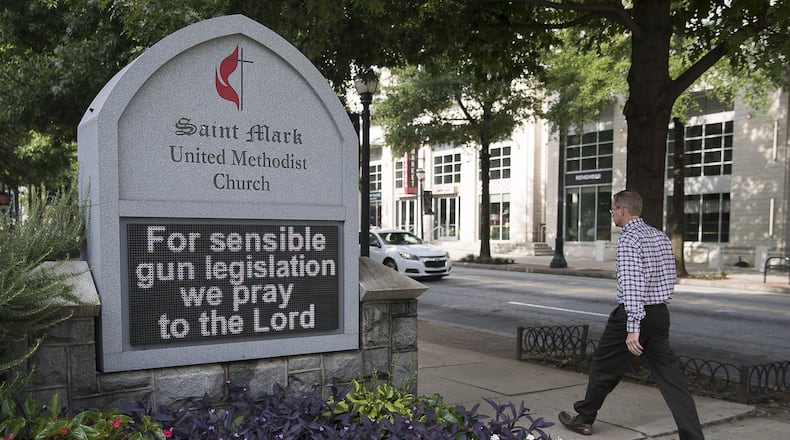On Sunday, Pastor Abby Norman arrived for the morning service at New Hope Methodist Church ready to preach about gun violence, but the members of the tiny southeast Atlanta congregation beat her to it.
Within hours, 31 people lost their lives in mass shootings in El Paso and Dayton. In El Paso, most of the victims were Latino. In Dayton, most were African American. In both cases, the shooters were angry white men.
“They named the problem and said we are lamenting that we live in a society where we have a problem with racism and that means we don’t love our neighbor,” she said. “We love our guns more than we love each other.”
They wanted to take it beyond the almost obligatory “pray for” refrain so often heard after every mass shooting, whether it’s in El Paso, Dayton, Oak Creek, Pittsburgh, Orlando or Christchurch, New Zealand.
“I think there are a lot of ways to pray,” said Norman, who has led the diverse church of about 20 members for less than two years. “When we vote, we pray. When we call our senators, we pray. The piece of prayer that’s missing is lament — when we admit what we have done wrong and ask God that we be better. They spoke very eloquently about it. They feel that something has to be done.”
Not that people have a problem with prayer.
They don’t.
The numbing number of massacres, however, has also pushed many people of faith to demand more.
>> TIMELINE: 21 mass shootings in the United States in 2019
“I think people of the Abrahamic faith traditions and all the prophets of God always came encouraging people to act while using prayer as their strength,” said Imam Arshad Anwar, of the Roswell Community Masjid. “Prayer is where you get your strength to keep on in the struggle. You have to do it, but it’s not the end-all be-all of faith. Prayer and action need to happen together.”
Faith communities, historically, have produced some of the nation’s most powerful leaders in the area of civil and human rights.
The Rev. Martin Luther King Jr., for instance, was birthed from a Southern pulpit.
Credit: Alyssa Pointer
Credit: Alyssa Pointer
And social movements and the faith communities have long worked hand in hand to push for change. Women of all faiths joined together in 2017 for the Women’s March in Washington, D.C., after the election of Donald Trump as president. Faith communities have also joined in protesting the detention of children at the border.
It’s important not to just say the right thing, but to do things that matter, said Rabbi Shalom Lewis, emeritus of Congregation Etz Chaim in east Cobb.
“Prayer is the launching pad,” said Don Plummer, a spokesman for the Episcopal Diocese of Atlanta, which includes about 60,000 members in 75 counties in Middle and North Georgia.
Bishop Robert C. Wright has banned firearms from all Episcopal churches, ministries and schools and lobbied for gun measures such as the Background Check Expansion Act S-42, which would ensure that firearms don’t end up in the hands of people who aren’t legally allowed to buy them.
>> RELATED | Opinion: AJC Editor, a Dayton ex-resident, on the mass shooting
At 11:30 a.m. Aug. 14, in Liberty Plaza in downtown Atlanta, the St. Luke’s Episcopal Church Advocacy Council has invited people to remember victims of gun violence and rally in support of the background check bill.
Bishop Paul S. Morton Sr., founder of the Full Gospel Baptist Church Fellowship and senior pastor of Changing A Generation Full Gospel Baptist Church in Atlanta, took to social media to vent his frustration.
“2 tell people just 2 pray is a cop out. I pray 4 people with high blood pressure. But I also tell them 2 do something lay off the Pork Chops or whatever is causing high pressure. I pray 4 people who want 2 lose weight. But you have 2 lay off the cake. Faith without works is dead.”
The Rev. Shanan Jones, pastor of The Gathering Baptist Church in College Park, told his congregation on Sunday that it was time for the church at large to “be about God’s business. Prayer, petition and the vote are God’s business.”
The Rev. Mark Lomax, pastor of First Afrikan Presbyterian Church in Lithonia, said it’s time to push lawmakers to pass reasonable gun policies. He said he’s not against gun ownership, but owning high-powered weapons allows someone to go into a crowded church, festival or store and kill dozens of people before police can stop him.
“It never stops with just prayers,” he said. “You also have to follow up and take some kind of action. Jesus prayed, then he healed. Jesus prayed, then he fed the masses. Jesus prayed, then he raised them from the dead. His prayers were always meaningful. They were not just empty words.”
About the Author
Keep Reading
The Latest
Featured






